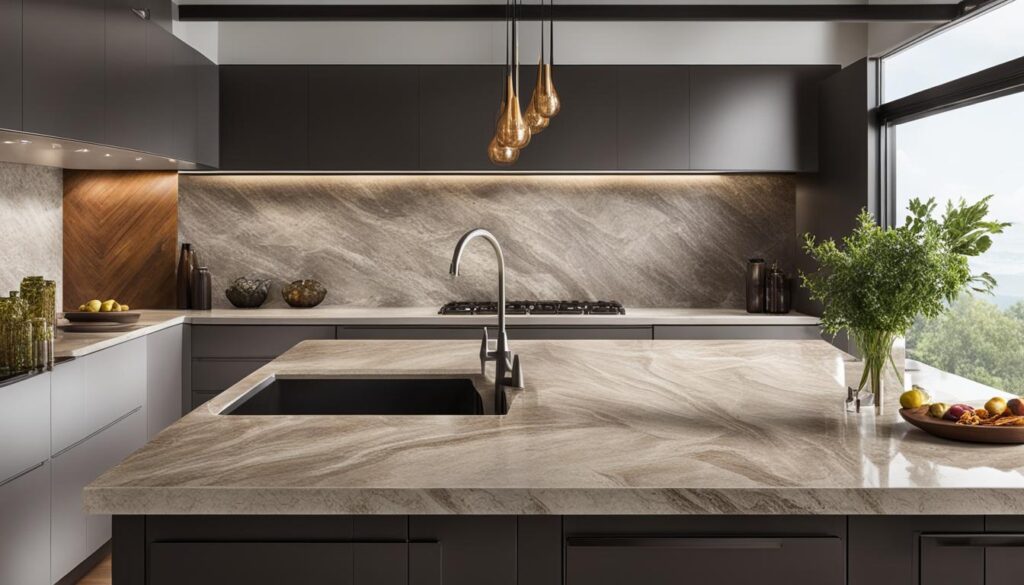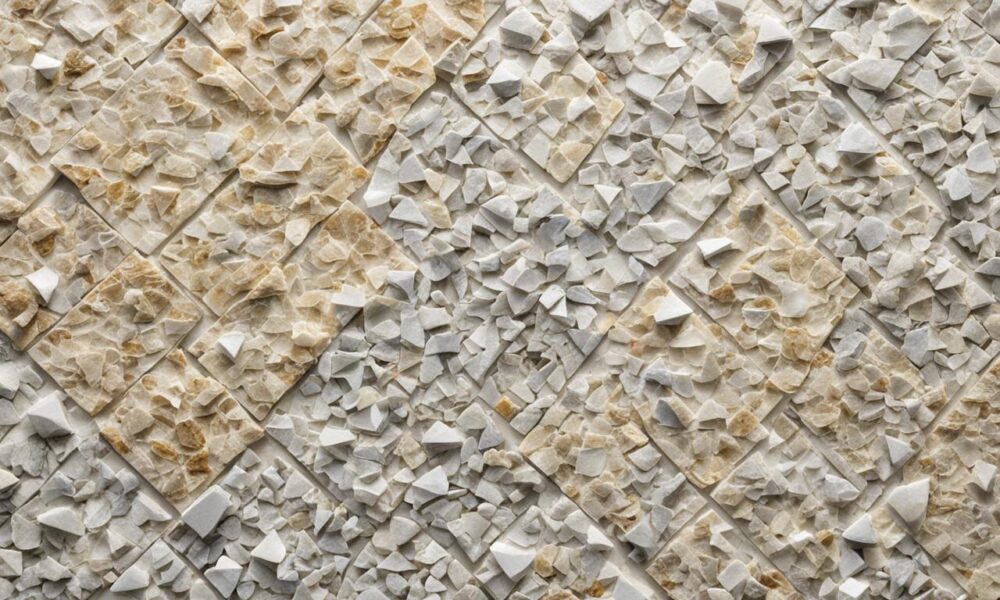Natural vs. Engineered Stone: Pros, Cons & Insights
Embarking on a kitchen remodeling can be both an exciting and daunting task. A key aspect of any kitchen design lies in the choice of countertops, an essential element that bears the brunt of daily activities. It’s a decision that involves not just picking colors and finishes but also choosing between Natural Stone vs. Engineered Stone. Each type of stone presents its own set of pros and cons, contributing to the ongoing comparison that homeowners and designers face. With considerations ranging from aesthetic preferences to practical functionalities, understanding the differences, benefits, and drawbacks is crucial in making an informed choice that aligns with your vision for durability, maintenance, and overall cost.
Key Takeaways
- Choosing between natural and engineered stone impacts both the aesthetic and functional aspects of kitchen countertops.
- Natural stones are each unique, with variations that add character and luxury to interiors.
- Engineered stones offer consistency and variety, with a broad spectrum of styles that emulate natural stones.
- Durability and longevity are key factors, with natural stone requiring more maintenance to preserve its beauty.
- Engineered stone boasts ease of maintenance and resistance to stains, scratches, and heat.
- Eco-friendliness and resource conservation play a significant role in the choice between natural and engineered stones.
- Understanding the cost implications and maintenance needs is essential for a wise countertop investment.
Natural Stone vs. Engineered Stone: Pros, Cons, and Everything in Between
As one examines the realm of stone countertops, the quandary of which is better between natural stone vs. engineered stone often emerges. The benefits of engineered stone include a broader variety, mirroring the textures and hues of granite and marble, paired with durability and cost-effectiveness. Its non-porous composition allows for a more effortless maintenance routine, which is resistant to stains, scratches, and heat, ultimately translating to a countertop that stands strong against daily wear and tear.
Yet, engineered stone may not satisfy the desire for uniqueness, as it generally lacks the innate, one-of-a-kind allure of natural stone—each slab of which tells its own earthly story. In contrast, natural stone elevates spaces with its luxurious, organic beauty and profound connection to the environment, boasting a timeless appeal that is as distinct as it is elegant. Its lasting durability ensures that with the appropriate care and regular sealing, it remains a treasured feature for years to come.
The drawbacks should also be addressed: natural stone, while opulent, brings a higher initial investment and necessitates continual maintenance. The continuous need for sealing can become a point for consideration in evaluating its long-term value and the commitment to upkeep. Whether to opt for the unparalleled uniqueness of natural stone or the modern resilience and variety of engineered stone shapes a pivotal part of the decision-making process concerning kitchen renovations.
Ultimately, the decision rests on personal tastes, environmental values, and lifestyle demands, balancing between the easy practicality of engineered selections and the incomparable character of natural alternatives. Below is a concise evaluation comparing the two competing countertop contenders:
| Feature | Engineered Stone | Natural Stone |
|---|---|---|
| Variety | Extensive styles and colors, can imitate natural stone | Unique patterns and textures, no two slabs are the same |
| Durability | Highly resistant to scratches, heat, and stains | Durable with regular maintenance and sealing |
| Maintenance | Low; non-porous surface simplifies cleaning | Higher; requires regular sealing and care |
| Eco-Friendliness | Varies; production process may impact the environment | Quarried from the Earth, minimizing factory pollutants |
| Cost-Effectiveness | Generally more affordable with less upkeep costs | Can be more expensive initially; potential resale value boost |
The table highlights fundamental differences between natural and engineered stones, guiding potential buyers on a path towards a choice that serves both their stylistic yearnings and functional requisites. Whether the decision sways towards the engineered marvel or the natural wonder, each offers a substantial foundation upon which to craft a kitchen masterpiece.
Understanding the Composition and Fabrication of Stone Countertops
The selection of countertops in a kitchen remodel involves a fundamental choice between the allure of natural stone quarries and the innovation behind engineered stone. Key aspects such as environmental impact, manufacturing process, and the eventual journey to a countertop shop in Omaha such as GMS Werks are all part of this critical decision-making phase.
Quarrying and Cutting: The Journey of Natural Stone
Natural stone encapsulates millennia, birthed from the silent depths of the Earth, emerging through an arduous process of quarrying and cutting. This method, while labor-intensive, has little intrusion on ecological stability, touting sustainable practices that safeguard our natural resources. Through precise extractions from natural stone quarries, each slab boasts an exclusive canvas painted by nature herself.

Characterized by its purity and a spectrum of exquisite patterns, natural stone undergoes meticulous crafting, transitioning from its raw form within vast quarries into finely honed surfaces ready to adorn living spaces. It’s an organic process, revered for minimizing factory-induced pollutants, thus proudly wearing the badge of Eco-friendliness.
The Engineering Process: Crafting Engineered Stone
In contrast, engineered stone unfolds its saga within the realms of technology, a symphony of mankind’s ingenuity. It commences by amalgamating crushed natural stone and resilient synthetic resins, tinted with pigmentation to perfect the aesthetic. The resulting product is engineered to impress, offering an laudable resistance to the trials of the everyday.
This process of crafting engineered stone does not occur without its environmental footprints. The manufacturing journey, while striving to emulate the hues and strengths of its natural counterpart, often involves higher energy consumption and potential waste generation. Despite this, engineered stone continues to flourish in popularity, heightened by its versatility and performance, which are championed by numerous countertop shops in Omaha and beyond.
Below, we encapsulate the contrasting natures of these two countertop materials, comparing the ethos behind their existence:
| Criteria | Natural Stone | Engineered Stone |
|---|---|---|
| Source | Directly from Earth’s quarries | Synthesized with natural stone particles |
| Eco-Impact | Less environmental degradation | Greater energy use and potential waste |
| Fabrication | Quarrying and cutting into slabs | Combining elements to form slabs |
| Aesthetic | Unique, natural variations | Consistent, controlled appearance |
| Durability & Maintenance | Durable with more maintenance | Durable with less maintenance |
The Aesthetic Battle: Comparing the Visuals of Natural and Engineered Stone
In the quest for the perfect kitchen or bathroom aesthetic, homeowners often find themselves caught in an aesthetic battle between the allure of natural stone slabs and the polished charm of engineered stone finishes. This visual comparison is not just about the immediate impact, but also the nuanced reflections of taste, lifestyle, and design intent that these surfaces convey.

Uniqueness of Natural Stone Aesthetics
When it comes to marble, granite, and other natural stones, each piece carries the weight of geological history, with intricate patterns and colorations that cannot be duplicated. The sheer unpredictability and diversity of veins, swirls, and hues make each piece a testament to the earth’s artistic mastery. Natural stone’s aesthetic appeal can indeed transform any countertop into the centerpiece of a room.
Consistency and Variety in Engineered Stone Finishes
Engineered stone, although lacking the random beauty of natural stones, compensates with its adaptability and uniformity. It grants designers the power to predict and fashion interiors with precision. From reproducing the classic look of marble to offering a spectrum of modern hues and textures, engineered stone finishes cater to the marrying of innovation with the essence of traditional stone aesthetics.
| Stone Type | Visual Appeal | Consistency | Variety |
|---|---|---|---|
| Natural Stone (e.g., Marble, Granite) | Unique patterns, luxurious effect | Each slab is distinct | Limited by nature’s design |
| Engineered Stone | Sophisticated imitation | Reliable consistency | Broad range of styles and colors |
Evaluating Durability: Which Stone Stands the Test of Time?
When selecting stone countertops, one of the most critical factors to consider is durability. The material chosen must endure daily use while maintaining its appearance and structural integrity over time. Both natural and engineered stones present formidable options, but they possess innate characteristics that cater to various requirements of longevity and resistance. This section delves into the enduring qualities of these materials and seeks to answer the perennial question in the engineered stone vs. natural stone debate: which type offers greater longevity and stands up to the rigors of daily life?
Natural Stone: Durability and Longevity
Natural stone durability stems from its inherent robustness that has allowed it to withstand natural elements over the centuries. Ideal for those who appreciate the beauty of imperfections and time-worn character, natural stone requires a commitment to regular maintenance. Sealing and careful handling can enhance its resistance to staining and bacteria, ensuring its luxurious appeal endures through countless meal preps and gatherings. Despite the maintenance, the uniqueness and rich patina that develop over time render natural stone an investment in longevity and classic elegance.
Engineered Stone: Durability Against the Elements
Conversely, engineered stone resistance is found in its non-porous surface, which fends off stains, bacteria, and scratches with ease. The manufacturing process imbues engineered stone with resilience against the elements, including heat and potential cracking. These factors contribute to a highly attractive option for areas subject to intense use. Low maintenance coupled with high durability places engineered stone as a compelling alternative, offering consistent beauty without the need for the rigorous upkeep associated with natural stone. Such qualities make engineered stone countertops a pragmatic yet stylish choice for modern living spaces striving for both functionality and design flair.



